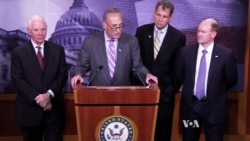A proposed 12-nation Pacific Rim free-trade pact supported by the Obama administration stumbled Tuesday in its first major congressional test when the U.S. Senate voted against considering so-called “fast-track” authority that would make trade accords immune to congressional changes, subject only to up-or-down votes.
Tuesday’s 52-45 vote fell short of the three-fifths backing required to begin debate on Trade Promotion Authority. Nearly unified Democrats voted “no” out of concerns that the bill fails to address the needs of displaced American workers, alleged currency manipulation by China and trade enforcement.
“We are not going to send American workers out on their own to navigate the choppy waters of global trade without protections that make this a fair fight,” said Democratic Senator Chuck Schumer of New York. “You cannot enforce a trade deal if you pre-bake the cake to leave the enforcement provisions behind.”
The Senate’s Republican majority leader expressed disappointment over the vote, noting that TPA passed the Finance Committee with bipartisan backing last month.
“There are always limits to what can be accomplished when the American people choose divided government,” Kentucky Republican Mitch McConnell said. “But of course it does not mean that Washington shouldn’t work toward bipartisan solutions."
Republican free-trade backers pledged to revisit the issue and said opponents’ concerns could be addressed once floor debate began.
“The question for today is not how the debate will proceed, but whether it will proceed at all,” said Republican Orrin Hatch of Utah, who co-authored the TPA bill. “Let’s keep in mind that 95 percent of the world’s consumers live outside the United States, and that if we want our farmers, our ranchers, manufacturers and entrepreneurs to be able to compete in the world marketplace, we need to be actively working to break down barriers for American exports.”
At stake is the ability to conclude an ambitious free-trade accord between 12 Pacific Rim nations that account for 40 percent of global economic output. If approved, it would be President Barack Obama’s crowning trade achievement. Paradoxically, it faces fierce opposition from many lawmakers of the president’s Democratic Party, like Senator Sherrod Brown of Ohio.
“There are losers and winners from this action [free trade],” said Brown. “The losers are those who lose their jobs, the small businesses that go out of business and the communities that get hurt by this. How do you ignore them?”
McConnell put the debate in geostrategic terms and America’s commitment to the Pacific Rim. “If we care about preserving and extending American leadership in the 21st century, then we cannot cede the most dynamic region in the world to China. It’s true from a national security perspective, and it’s true from an economic perspective,” he said.
Trade’s impact on American jobs makes it especially contentious for lawmakers. “Trade is a controversial issue. It’s important to America’s economy,” said Democratic Senator Richard Durbin of Illinois. “But when you take it home, and you meet with people you represent, there are strong mixed feelings about trade.”
Tuesday’s vote is far from the end of debate on Capitol Hill. Although most pro-free trade Democrats voted against launching debate Tuesday, many said they were eager to reach an agreement that would allow floor deliberations on TPA — and the trade pacts it would facilitate — to go forward.





